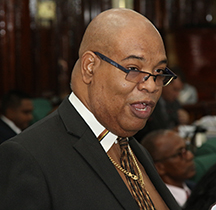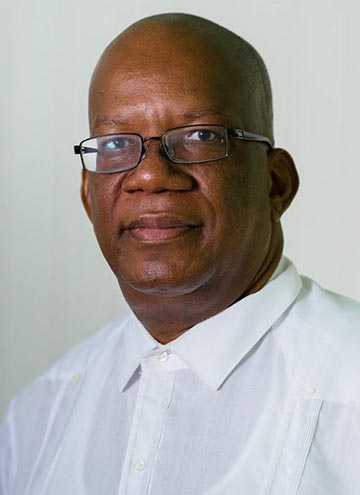With questions raised over the sole-sourcing of almost $367 million in emergency drugs from a US-based company last year, Finance Minister Winston Jordan has distanced the National Procurement and Tender Administration Board (NPTAB) from bearing responsibility for the deal, while saying that it’s approval is usually determined by the case put forward by the procuring entity.
“If Ministry of [Public] Health or GPHC [Georgetown Public Hospital Corporation] comes to NPTAB and puts down as their reason ‘it is urgent, it is a do or die situation,’ NPTAB is not going to say, ‘no, go to open tender.’ That could take three or four months and be responsible for people dying and so on. The essence of this thing has to go back to procuring entity,” Jordan told Sunday Stabroek.
“If there a loophole, the loophole has to be at the procuring agency. For drugs to be deemed emergency is not for NPTAB to determine, that it is [for] the procuring entity,” he added.

The sole-sourcing of $366.9 million in emergency drugs has once again put decisions by the Ministry of Public Health under scrutiny as supplier HDM Labs Inc. was handpicked over three other companies that went through tendering and were declared to have failed the evaluation process.
The NPTAB falls under the Minister of Finance’s authority and when Sunday Stabroek visited that agency last Thursday, Chairman Berkley Wickham said all questions should be directed to the ministry’s Public Relations Officer and the procuring entity.
People’s Progressive Party/Civic (PPP/C) parliamentarian Juan Edghill is among those calling for every aspect of the transaction to be explained.
“Every aspect of this transaction is suspicious and points to acts of insider trading, contract fixing and squandering of public funds and the government’s newly-discovered fetish, misconduct in public office,” he wrote in a letter to the editor of this newspaper.

He has called on Minister of Public Health Volda Lawrence to provide answers on the award so that the nation could see that the transaction was above board and is in no way corrupt. “Why were items omitted from the “big pharmaceuticals tender” and then subsequently sole-sourced from HDM Labs Inc.? An examination of the items that were omitted from the “big pharmaceuticals tender” that was subsequently sole-sourced from HDM Labs Inc. strongly suggests a fixing of this arrangement. I am sure that the Minister would accept this opportunity, as part of her new found anti-corruption campaign, to explain how this omission occurred. Who was responsible for this grave violation? And if sole-sourcing to HDM Labs Inc. was the best possible option available to remedying this unusual occurrence, could the Minister further state whether we received value for money by way of this purchase?” he questioned.
Edghill noted that on June 19th, 2017, the Permanent Secretary (PS) of the Ministry of Public Health Collette Adams wrote to the Chairman of the NPTAB requesting the sole-sourcing of $366,926,660 to facilitate the transaction. He said in her letter, Adams stated the following: “HDM Labs Inc. has great capacity in delivering Supplies to the Ministry of Public Health within two weeks’ time frame” and “HDM Labs Inc. is a recognized and efficient supplier countrywide.” As a result, Edghill has called on Lawrence, in the interest of transparency, to inform the nation who is the owner(s) or principal(s) of HDM Labs Inc., when they were registered for business in Guyana and on what occasion(s) they delivered pharmaceuticals to the Ministry of Public Health within a two weeks’ time frame, as stated by the PS.
Lawrence was also called on to substantiate the claim that HDM Labs Inc. is a recognized and efficient supplier nationwide. “Specifically, we would like to be informed about which companies/institutions, apart from the Ministry of Public Health, HDM Labs Inc. supplied pharmaceuticals to and the quantities, within the last two years? Further, please state why companies that manufacture and distribute these pharmaceuticals, locally, were not offered an opportunity to provide these services?” he asked.
Edghill has also called for the NPTAB’s letter of approval for the contract to be made public, with an explanation as to which provision under Section 28 of the Procurement Act was used as the basis for the approval.
‘Was there a breach?’
But Lawrence told this newspaper that from her knowledge of the award, no evidence has been provided to state that there was anything illegal.
“Does NPTAB have a problem? Was there a breach?” she asked even as she said that NPTAB would have to justify the approval and that the PS could also explain.
“Well you have to ask NPTAB. Please ask the PS. I don’t understand. If something was passed at the NPTAB, what is wrong? She [the PS] wrote NPTAB and, it is above the ministerial level, then it would have been evaluated and it [approval] would have come from NPTAB. It is why I asked if there was a breach. If there was a breach, then I am concerned. You have to ask the PS because I can’t tell you. I am reading the thing [newspaper articles] and I don’t see anything about any breach or anything like that and that is for NPTAB… whether that is within the confines of the procurement regime, you have to ask them; you are asking the wrong person,” Lawrence added.
She pointed out that NPTAB has a list of evaluators for its contracts of which they will select for the awards and as such should be the ones facing questions. “Once it is above the ministry level and if NPTAB granted the request to have this procurement, then if you have a question then you should go back and question NPTAB,” she stressed.
Since assuming responsibility for the ministry, Lawrence has taken a vocal anti-corruption posture in her management and recently even announced plans to call in the police on errant employees.
Under the former PPP/C administration, competitors had lamented a procurement system designed to favour the company belonging to Dr Ranjisinghi ‘Bobby’ Ramroop, a friend of former president Bharrat Jagdeo. That company, The New Guyana Pharmaceutical Corporation (New GPC), would annually receive the lion’s share of contracts.
Since entering office in 2015, the APNU+AFC government has had its share of controversy when shortly after one year in office, it was revealed only through probing in the National Assembly that a bond was sole sourced to PNCR supporter Larry Singh at a cost of $12.5 million per month. Singh had never run a bond storage operation before and critics have said the deal appeared to be a sweetheart arrangement to give business to a PNCR supporter.
Last year, the sole-sourcing of $632 million in drugs, including $605 million from ANSA McAl, was also mired in controversy, which led to an investigation of Lawrence’s role. The procurement was found to have breached the law but Lawrence was cleared of any wrongdoing.
‘Tender board’s role’
Jordan has defended NPTAB’s role, saying that the agency works strictly within the confines of the laws. Its role, Jordan said, does not include questioning agencies if they claim they have emergencies.
“If [the ministry] comes and says it is an emergency, who are we at NPTAB to say it isn’t? So, whenever they say NPTAB, it is only to say ‘we got approval to sole source’ but the request for sole-sourcing don’t come from NPTAB, it comes from the agency. We look at the reasons they put up to sole-source and on the strength of the reasons put up, NPTAB will give the go ahead to sole-source. So, if, for example, the Ministry of Health says… ‘we get ten patients waiting for treatment for their diabetes and so on,’ what [are] you at NPTAB going to say? No? We don’t want to be responsible for people going into a diabetic coma and so on. So, if they say need the drugs rushed to them and so on, then they [NPTAB] would say ‘okay, sole source,’” Jordan explained.
“It is not for NPTAB to determine the reasons. NPTAB goes through the reasons given. They have the laws to work with and their roles. NPTAB don’t necessarily like sole-sourcing activities but if you come and say you run out of drugs and you need this as a matter of urgency, and this is the person who said they can fly it in, say within 24 hours, then what you put up to get the approval for sole-sourcing is what will determine,” he added.
He stressed that if subsequent investigations find that the reasons stated as emergency were not in keeping with guidelines of what constitutes an emergency, it is not NPTAB’s fault and the procuring entity can be sanctioned.
“If you found out subsequently it is not so, it is not NPTAB’s fault, it is the procuring agency’s fault, because they would have put up information contrary to what was available at the time. I outlined what will be their role. NPTAB, at the end of the day, will go through the laws on sole-sourcing—it’s an emergency, it is only one supplier that can supply, and it is this or that—and if it meets any number of those tests, it would give the approval. To get sole-sourcing requires 1, 2, 3, 4, 5. If the procuring entity says this company is the only company supplying this drug, then NPTAB has no other choice but to say sole-source,” Jordan said.
“But if NPTAB finds out that there are three more agencies that do this, it couldn’t be NPTAB’s fault. It has to be the fault of the procuring agency as to whether reliable accurate information was provided to NPTAB, whether it was the truth or the facts were hidden. NPTAB has its role and has to go strictly by the law. A complaint to the [Public Procurement Commission] can be made and they can now delve in to see what really happened and so forth,” he added.






